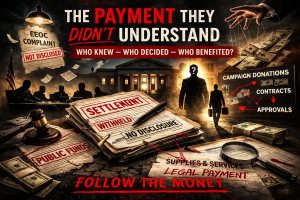Episode 5: The Chain of Command What the Battistelli Fallout Revealed About Lorain County’s Power Brokers

Behind Closed Doors, Above the Law — How Petticord, Tomlinson, and Moore Evaded Oversight to Push Through a Secret Payout
May 03, 2025
By Aaron Knapp | Lorain Politics Unplugged
⚡️ Legal Disclaimer: All quotes are taken directly from the sworn depositions of Michelle Hung, JD Tomlinson, Dan Petticord, Jeffrey Riddell, and other public officials. Verified exhibits, requisition records, and court filings are used to establish the facts.

Thanks for reading Aaron’s Substack! Subscribe for free to receive new posts and support my work.

I. “You Have to Talk to Dave”
In a damning admission buried inside a 558-page Sheriff’s Office filing, Jennifer Battistelli told investigators that JD Tomlinson made one thing clear when she inquired about her payout: “You have to talk to Dave.” The Dave in question was Commissioner Dave Moore—the Board President who allegedly greenlit the $100,000 settlement without ever discussing the complaint publicly.
Under sworn testimony, Michelle Hung confirmed she had never seen the EEOC complaint until after the settlement was approved. When asked if she would have voted yes had she known about the sexual assault and quid pro quo allegations, her response was unequivocal: “Absolutely not. I would have had so many questions, and they know it.”
And yet, the settlement appeared as a line item on a last-minute requisition list, marked only as a legal expense. There was no public hearing. No executive session. No consultation with CORSA, the County’s risk insurer. Instead, the plan was simple: settle fast, keep it quiet, and get the Board to sign off before anyone noticed.
According to Hung, that strategy relied on silence and cooperation from Moore. She testified that County Administrator K.C. Saunders told her the requisition was added at the direction of Moore and Assistant Prosecutor Dan Petticord. And Petticord—in an email obtained as Relator’s Exhibit 7—wrote that he had just learned he could push the settlement through “as a requisition.”
This was not bureaucratic improvisation. It was a conscious strategy. And as Battistelli testified in the OPS file, the order to deal with Moore wasn’t casual. It was a gatekeeping function. Moore, it turns out, was the man to make it happen—and keep it from becoming public.
In that light, Tomlinson’s suggestion that someone should “talk to Dave” wasn’t a passing comment. It was a handoff—a quiet transfer of responsibility to the one man who could slide it past scrutiny.

II. Dan Petticord’s Double Role
Assistant Prosecutor Dan Petticord served as both the legal advisor to the Board of Commissioners and, effectively, the liaison for JD Tomlinson during the Battistelli payout.
In deposition after deposition, Petticord is cited as the person who told commissioners the settlement was simply a legal bill that needed to be paid.
But emails show something else entirely. In Exhibit 7, Petticord directly responds to Battistelli’s attorney Jack Moran by confirming he could submit the settlement via requisition—a method that bypasses the formal resolution process and public scrutiny. “Just found out I can do this as a requisition,” Petticord wrote. Within days, the payment was on the agenda.
At no point did Petticord advise the Board to seek outside legal counsel. He didn’t inform them that the EEOC complaint involved sexual misconduct. He didn’t notify them that Tomlinson was the subject of the complaint. Instead, he downplayed the issue and insisted the payment be processed without delay.
Michelle Hung recounted: “Dan told me it was a legal bill and the appointing authority says it has to be paid.” But when Hung later questioned Petticord during a public meeting about how the settlement got on the agenda, he denied any involvement. (Meeting Transcript, Relator’s Exhibit 21)
This was a lie—plain and simple. As Hung stated in her deposition: “It appears so in the minutes here, yes.” Petticord misled the commissioners and the public. And he did so while wearing the badge of public legal counsel.
His failure to disclose material facts. His submission of the payment under false pretenses. His misrepresentation of his own role. These are not procedural errors. These are ethical breaches.

III. Dave Moore and the Vote
Commissioner Dave Moore’s role in the Battistelli cover-up has emerged more clearly with each deposition. While Hung and Riddell say they were misled, Moore has not offered public testimony. But what we do know is this: the payment only happened because Moore voted yes.
According to Michelle Hung, the Board had no policy or precedent for paying out settlements without executive session or CORSA review. In fact, nearly all prior settlements involving staff misconduct or employment claims were either denied, discussed in session, or handled through the insurer.
So why the rush here? And why the silence?
Hung testified that Administrator Saunders named Moore as one of the individuals who directed the payment be added to the agenda. Petticord’s email confirms the timing was critical—Battistelli’s attorney had threatened to file the EEOC complaint if the payment wasn’t approved by October 17. That deadline was met. The complaint was never filed. And the matter disappeared from public view—until lawsuits and subpoenas forced it back into the light.
Moore’s silence throughout the investigation has been deafening. He has not responded to press inquiries. He has offered no rebuttal to sworn statements from his colleagues. And he has not disputed the assertion that he personally cleared the path for Tomlinson’s secret settlement.
By doing so, Moore betrayed not just the public trust—he violated the public record. He allowed a public payment to be processed without transparency, accountability, or explanation. And when the truth came out, he said nothing.
In silence, he became complicit. In action, he became indispensable.
IV. The Requisition Ruse
The decision to funnel the Battistelli payout through a requisition rather than a formal resolution marked a pivotal moment in the scheme. A requisition, unlike a resolution, bypasses the deliberative process. It does not require public discussion or debate. It is, in effect, an internal invoice. Used properly, it speeds up small expenses. Used deceptively, it conceals scandal.
According to the testimony of Michelle Hung, the requisitions received by the commissioners on October 17, 2023, were routine—until they weren’t. Hung testified that she received a second version of the list just hours before the vote, and it included a $100,000 settlement labeled vaguely as “legal expenses.”
“I asked my assistant to go down and get a copy of the settlement,” Hung said. “We didn’t know what it was for. Dan [Petticord] came in later and said the appointing authority said we have to pay it.”
Hung was alarmed. She testified that she confronted K.C. Saunders, the County Administrator, about how the item made it onto the requisitions. “He eventually said it was at the direction of Petticord and Moore,” Hung stated.
Exhibit 7, entered into the record, supports that claim. In an email from Petticord to attorney Jack Moran, Petticord states, “Just found out I can do this as a requisition.” The date was October 13, four days before the meeting. The timing was not coincidental—it was strategic.
By submitting the settlement via requisition, Petticord and Moore avoided an executive session. They avoided CORSA review. They avoided a public vote on a resolution. And they avoided alerting Commissioner Hung or the public until the eleventh hour.
Hung later questioned Petticord on the record during the March 26, 2024, budget hearing. According to Relator’s Exhibit 21, Petticord denied involvement, claiming the fiscal office handled the requisition. Hung immediately challenged this. “That’s not what you said to me,” she stated.
The deception was layered. Petticord not only misrepresented the requisition process—he also misled the commissioners about the nature of the settlement. In deposition, Hung recounted that Petticord told her it was simply a “legal bill” and minimized the substance of the EEOC complaint.
What was concealed? That the complaint alleged sexual misconduct and quid pro quo retaliation. That the subject was Prosecutor JD Tomlinson. That the attorney pushing for the payout, Jack Moran, had given Petticord an ultimatum: pay by October 17 or the complaint becomes public.
With the requisition maneuver, they paid. And the complaint stayed buried—until now.
V. The Policy That Wasn’t Followed
When Michelle Hung cast her vote to approve the Battistelli settlement, she did so under the impression that it was a routine legal bill. But beneath that simple label was a web of procedural violations that undercut the legal norms Lorain County had followed for decades.
“The payment to Battistelli is not a supply or service,” Hung clarified under oath. Yet that’s precisely how it was labeled—$100,000 disguised as “supplies and services for various county departments,” slipped onto a list of budgetary transfers for a late-day vote. There was no formal legal resolution. No independent review. No public hearing. The public was never even told what it was voting on.
This approach, Hung emphasized, was not how the County had handled previous settlements. “We always discussed these matters in executive session. That’s how it was done,” she testified. Prior to this incident, any case involving staff misconduct or liability claims—no matter how small—was vetted through a multi-step process, often involving the Board’s legal counsel and risk insurer.
Hung had never before seen a six-figure payout handled this way. “I knew it was extraordinary from the way we normally did things,” she said. When she inquired about who initiated the requisition, she was told by County Administrator K.C. Saunders that it was directed by Dan Petticord and Commissioner Dave Moore.
If that wasn’t irregular enough, the matter eventually submitted to CORSA, the County’s insurance carrier–after JD Tomlinson shopped legal firms Wickens, Herzer, Panza and Flannery Georgalis, —despite its responsibility to evaluate potential liability claims. According to Hung, CORSA was routinely brought in on sensitive legal issues. But this time, no request was made. The reason, she believes, is simple: “If they had been forthcoming with this, we would have had a discussion in executive session… Legal counsel that was actually there representing the commissioners would have advised us on our options and choices.”
Instead, no options were presented. No counsel spoke. And no votes were recorded until it was too late.
Even more concerning, the EEOC complaint—marked as Relator’s Exhibit 1 and alleging serious sexual misconduct—was never made available to the full board before the vote. Hung testified, “Absolutely not. I would have had so many questions, and they know it,” when asked whether she would have approved the payment had she seen the complaint beforehand.
Tomlinson and Petticord’s decision to route the settlement through a requisition instead of a resolution short-circuited the County’s checks and balances. It evaded the procedures that would have triggered transparency and potentially CORSA’s review.
To this day, no written policy has been produced explaining why the Battistelli payment was handled so differently from other settlements. Hung and others say there isn’t one. “This whole thing went around the system we had in place,” she testified.
It didn’t just go around it—it weaponized the system against accountability. What should have been a deliberative process became a silent transfer of public funds, conducted by a handful of insiders operating outside public view.
VI. Silence, Complicity, and Consequences
As the fallout from the Battistelli payout continues to unfold, what remains most disturbing is the culture of silence that surrounded the entire transaction. The decision to quietly pay out $100,000 in public funds—without disclosing the EEOC complaint, without holding an executive session, and without CORSA review—was not merely a failure of process. It was a coordinated act of complicity.
Michelle Hung testified under oath that she had no prior knowledge of the complaint against JD Tomlinson, and had she known, she would have voted no. “Absolutely not,” she stated. “I would have had so many questions, and they know it.” Her words echoed the frustration of a public official left in the dark about a matter of major importance.
But silence wasn’t just imposed—it was enforced. When Hung later questioned Assistant Prosecutor Dan Petticord publicly about how the settlement landed on the agenda, he claimed ignorance. Yet his own email, dated October 13 and marked as Relator’s Exhibit 7, confirmed he had initiated the requisition process:
“Just found out I can do this as a requisition,” he wrote. This directly contradicted his denial at the March 26 meeting.
That lie—told in a public forum—wasn’t a momentary lapse. It was part of a pattern. Petticord also failed to advise the commissioners to seek independent legal counsel, even though his dual loyalties to Prosecutor Tomlinson and the Board of Commissioners clearly conflicted. As Hung noted, “I was the one who brought that up. I asked if he brought it up to Riddell. It never went anywhere.”
The effect of that silence? Public money spent in secret. A sexual harassment claim shielded from public review. A county prosecutor insulated from scrutiny. “I believe the legal counsel should have been—commissioners should have had their own legal counsel and the prosecutor should have had his own legal counsel, but that’s not the way it was done,” Hung said plainly.
Perhaps the most galling aspect was the manipulation of the language surrounding the payment. The requisition listed the payout as an expense for “services and supplies,” which it clearly was not. “Jennifer Battistelli didn’t supply any legal services,” Hung confirmed. The description was misleading by design.
And while Moore and Riddell have yet to offer public explanations for their votes, they remain implicated by omission. Neither man disclosed the complaint. Neither disputed Petticord’s version of events when it mattered. Inaction was, in effect, endorsement.
Tomlinson, meanwhile, has continued to deny all wrongdoing, despite evidence that the complaint involved allegations of quid pro quo sexual conduct and assault. As Hung interpreted the complaint: “The job was in exchange of money for sex.” That, in itself, is a felony. The failure to disclose it is a scandal.
In deposition, Hung was asked if the failure to release the EEOC complaint shielded Tomlinson and his staff from scrutiny. She responded without hesitation: “Yes.” She added, “The public has a right to know why its money is being spent and what its officials do.” And yet, for months, that right was denied.
The consequences are still playing out. But one fact is now undeniable: silence was not passive. It was policy.
Final Thought: Silence Was the Strategy
By the time the dust settled on the Battistelli payout, the damage had already been done. One hundred thousand dollars in public funds was quietly funneled to make a problem disappear, while those entrusted to uphold transparency—Dan Petticord, Dave Moore, JD Tomlinson—chose concealment over candor.
This wasn’t a bureaucratic lapse. It was a blueprint. It involved backchannel approvals, deliberately mislabeled requisitions, and a silence so intentional it became policy. The public’s right to know was trampled in the rush to protect one man’s career and another’s political alliances.
Michelle Hung tried to raise the alarm, but she was boxed out. The complaint was hidden. Outside legal counsel was never brought in. Those who spoke up were ignored—or lied to.
Tomlinson has since lost his seat. But Moore is still sitting on the dais. Petticord is still collecting a check. And the Lorain County public is left footing the bill for a secret they were never supposed to find out about.
This episode wasn’t a fluke. It was the system working exactly as its architects intended.
We’re not done.
— Aaron Knapp
Final Legal Disclaimer: All events and quotes cited in this report are sourced from verified public records, depositions, and official meeting transcripts. The information is presented for civic awareness and public accountability. All facts were verified against original source materials.
Coming next: Episode 6 — The Janik Precedent and the JR White Whisper Campaign
Correction: A previous version of this article mistakenly referred to K.C. Saunders as the County Administrator. He is, in fact, the Budget Director for Lorain County. The correction applies to Part 3, paragraph 3; Part 4, paragraph 4; and Part 5, paragraph 4 of the published story.




